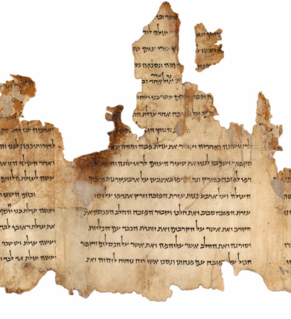
The two Books of Kings, originally a single book, are the eleventh and twelfth books of the Hebrew Bible or Old Testament. They conclude the Deuteronomistic history, a history of Israel also comprising the books of Joshua and Judges and the two Books of Samuel, which biblical commentators believe was written to provide a theological explanation for the destruction of the Kingdom of Judah by Babylon in c. 586 BCE and a foundation for a return from exile. The two books of Kings present a history of ancient Israel and Judah from the death of King David to the release of Jehoiachin from imprisonment in Babylon, a period of some 400 years. Scholars tend to treat the books as made up of a first edition from the late 7th century BCE and a second and final edition from the mid 6th century BCE.
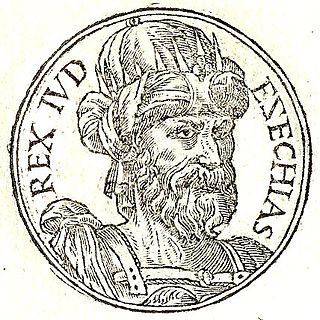
Hezekiah was, according to the Hebrew Bible, the son of Ahaz and the 13th king of Judah. Edwin Thiele concluded that his reign was between c. 715 and 686 BC. He is considered a very righteous king by the author of the Books of Kings. He is also one of the most prominent kings of Judah mentioned in the Bible and is one of the kings mentioned in the genealogy of Jesus in the Gospel of Matthew.

Jeroboam I was the first king of the northern Kingdom of Israel after the revolt of the ten northern Israelite tribes against Rehoboam that put an end to the United Monarchy.

According to the Hebrew Bible, the Kingdom of Israel was one of two successor states to the former United Kingdom of Israel and Judah. Historians often refer to the Kingdom of Israel as the "Northern Kingdom" or as the "Kingdom of Samaria" to differentiate it from the Southern Kingdom of Judah. For their parallel history see History of ancient Israel and Judah.

Obadiah is a Biblical theophorical name, meaning "servant of God" or "worshiper of Yahweh". The form of Obadiah's name used in the Septuagint is Obdios; in Latin it is Abdias; in Arabic it is عوبديا ʿŪbadyā. The Bishops' Bible has it as Abdi.
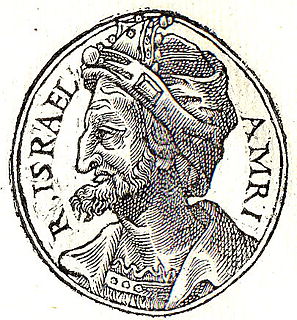
Omri was, according to the Hebrew Bible, the sixth king of Israel. He was a successful military campaigner who extended the northern kingdom of Israel. Other monarchs from the House of Omri are Ahab, Ahaziah, Joram, and Athaliah. Like his predecessor, king Zimri, who ruled for only seven days, Omri is the second king mentioned in the Bible without a statement of his tribal origin. One possibility, though unproven, is that he was of the tribe of Issachar.
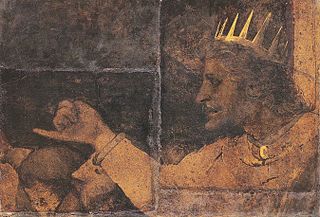
Rehoboam was the fourth king of Israel according to the Hebrew Bible. He was a son of and the successor to Solomon, and a grandson of David. In the account of I Kings and II Chronicles, he was initially king of the United Monarchy of Israel, but after the ten northern tribes of Israel rebelled in 932/931 BC to form the independent Kingdom of Israel (Samaria), under the rule of Jeroboam, Rehoboam remained as king only of the Kingdom of Judah, or southern kingdom.
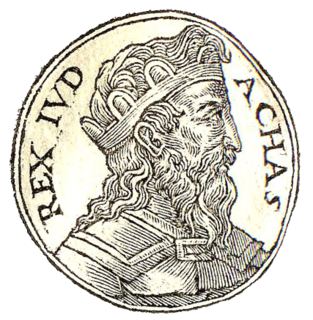
Ahaz (Hebrew: אָחָז, ʼAḥaz, "has held"; Greek: Ἄχαζ, Ἀχάζ Akhaz; Latin: Achaz; an abbreviation of Jehoahaz, "Yahweh has held" was king of Judah, and the son and successor of Jotham. Ahaz was 20 when he became king of Judah and reigned for 16 years.
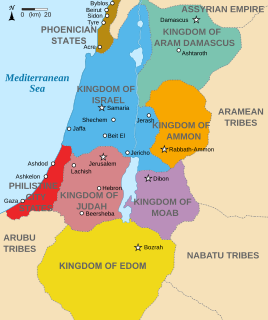
Moab is the historical name for a mountainous tract of land in Jordan. The land lies alongside much of the eastern shore of the Dead Sea. The existence of the Kingdom of Moab is attested to by numerous archaeological findings, most notably the Mesha Stele, which describes the Moabite victory over an unnamed son of King Omri of Israel. The Moabite capital was Dibon. According to the Hebrew Bible, Moab was often in conflict with its Israelite neighbours to the west.
Hiram I was the Phoenician king of Tyre according to the Hebrew Bible. His regnal years have been calculated by some as 980 to 947 BC, in succession to his father, Abibaal. Hiram was succeeded as king of Tyre by his son Baal-Eser I. Hiram is also mentioned in the writings of Menander of Ephesus, as preserved in Josephus's Against Apion, which adds to the biblical account. According to Josephus, Hiram lived for 53 years and reigned 34.
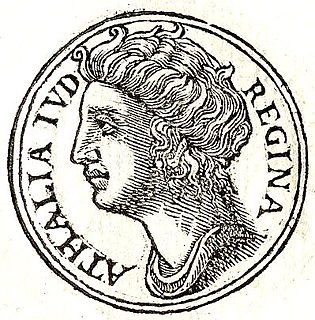
According to the Hebrew Bible, Athaliah was queen consort of Judah as the wife of King Jehoram, a descendant of King David, and later queen regnant c. 841–835 BCE.

Jehoash, also known as Joash, Joas or Joás, was a king of Judah, and the sole surviving son of Ahaziah after the massacre of the royal family ordered by his grandmother, Athaliah. His mother was Zibiah of Beersheba. Jehoash was 7 years old when his reign began, and he reigned for 40 years. He was succeeded by his son, Amaziah of Judah. He is said to have been righteous "all the days of Jehoiada the priest".
Hilkiah was a Hebrew priest ("Kohen") at the time of King Josiah. His name is mentioned in II Kings. He was the High Priest and is known for finding a lost copy of the Book of the Law at the Temple in Jerusalem at the time that King Josiah commanded that the Temple be refurbished. His preaching may have helped spur Josiah to return Judah to the worship of Yahweh, God of Israel.
The Chronicles of the Kings of Israel is a book that gives a more detailed account of the reigns of the kings of ancient Kingdom of Israel than that presented in the Hebrew Bible, and may have been the source from which parts of the biblical account were drawn. The book was likely compiled by or derived from the kings of Israel's own scribes, and is likely the source for the basic facts presented in the Bible.
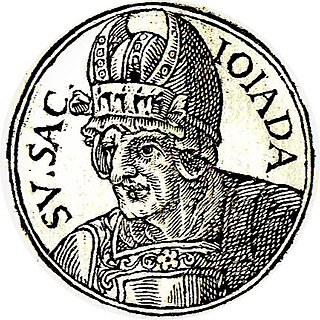
Jehoiada in the Hebrew Bible, was a prominent priest during the reigns of Ahaziah, Athaliah, and Joash. Jehoiada became the brother-in-law of King Ahaziah as a result of his marriage with princess Jehosheba. Both Jehosheba and Ahaziah were children of King Jehoram of Judah. Ahaziah died a year after assuming the throne, which was then usurped by his mother Athaliah, who ordered the execution of all members of the royal family.
Joah is a Hebrew masculine given name, which means "Yahu is his brother" or "God is his brother." It is derived from the two words "Yahu" and "ach". Joah may refer to:
Jehu son of Hanani was a prophet mentioned in the Hebrew Bible, who was active during the 9th century BC.
Asaph is the name of three men from the Old Testament or Hebrew Bible. The articles related to the son of Berachiah and descendant of Kohath refer to the same person.

Hosea 1 is the first chapter of the Book of Hosea in the Hebrew Bible or the Old Testament of the Christian Bible. This book contains the prophecies spoken by the prophet Hosea son of Beeri, especially the spiritual whoredom of Israel set forth by symbolical acts. It is a part of the Book of the Twelve Minor Prophets.
